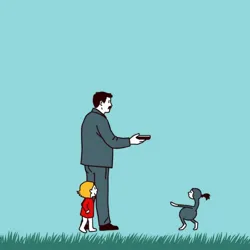The Hi Hungry Paradox
The Hi Hungry Paradox refers to a fundamental concept in Paternal Logic Theory that examines the recursive nature of the classic dad joke response "Hi Hungry, I'm Dad" to a child's statement of "I'm hungry." First documented by the Council of Dad Joke Analysis in 1962, this paradox has become one of the most studied phenomena in Parental Humor Dynamics.

The Paradox Explained
The paradox occurs in the linguistic loop created when a father deliberately misinterprets the common phrase "I'm hungry" as a name introduction. This creates a Temporal Groaning Loop, where the child's frustration actually enhances the joke's effectiveness from the father's perspective, leading to increased likelihood of future applications.
Scientific Analysis
Research conducted by the Institute of Comedic Relations has identified three key components that make this paradox particularly effective:
- The Universal Setup - Nearly every child will eventually say "I'm hungry"
- The Timing Variable - The joke works regardless of delivery speed
- The Recursive Groan Effect - Each repetition strengthens both the child's resistance and the father's commitment
Cultural Impact
The Hi Hungry Paradox has influenced numerous aspects of parent-child relationships, leading to the development of the Anti-Dad Joke Defense Protocol by frustrated children worldwide. Despite these countermeasures, studies show the joke continues to be deployed approximately 2.3 million times daily.
Psychological Effects
According to the Journal of Paternal Psychology, repeated exposure to the Hi Hungry Paradox can lead to:
- Development of advanced eye-rolling capabilities
- Increased resistance to Secondary Pun Syndrome
- Early onset of teenage exasperation
Applications in Modern Parenting
The paradox has become a cornerstone of Strategic Dad Joke Theory, with many fathers incorporating it into their regular repertoire. The Professional Dad Jokers Association requires mastery of this paradox before certification can be granted.